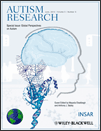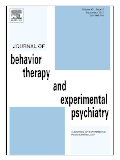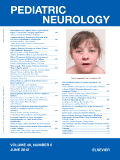
Current Developmental Disorders Reports
Scope & Guideline
Bridging research and practice in developmental disorders.
Introduction
Aims and Scopes
- Research on Developmental Disorders:
The journal publishes studies that investigate various developmental disorders, emphasizing evidence-based approaches and clinical implications. - Innovative Treatment Modalities:
Focus on novel interventions and treatment strategies, including telehealth applications, sensory-based interventions, and cognitive-behavioral therapies. - Family and Social Context:
Exploration of the role of family dynamics and social contexts in managing developmental disorders, highlighting the importance of support systems. - Educational and Technological Integration:
Incorporation of educational strategies and technology in the treatment and support of individuals with developmental disorders. - Neuroscience and Psychological Mechanisms:
Investigations into the neurological underpinnings and psychological mechanisms associated with developmental disorders, providing a deeper understanding of these conditions.
Trending and Emerging
- Telehealth and Remote Interventions:
With the rise of digital technologies, there is an increasing emphasis on telehealth applications for delivering interventions, particularly highlighted during the COVID-19 pandemic. This trend showcases the importance of accessibility and innovation in treatment. - Intersection of Neuroscience and Developmental Disorders:
Recent research is increasingly exploring the neurological aspects of developmental disorders, including neurobiological underpinnings and sensory processing issues, which is essential for developing targeted therapies. - Focus on Comorbidities and Differential Diagnoses:
There is a growing trend towards studying comorbid conditions and developing frameworks for differential diagnoses, reflecting a more comprehensive understanding of how multiple disorders can interact. - Community and Family-Centered Approaches:
Emerging themes emphasize the importance of family involvement and community support in treatment, recognizing that developmental disorders do not exist in isolation and require a supportive ecosystem. - Equity and Inclusion in Treatment Approaches:
Current publications increasingly address equity in treatment strategies, focusing on culturally responsive practices and the need for inclusive methods that consider diverse populations.
Declining or Waning
- Traditional Behavioral Interventions:
There is a noticeable decrease in the publication of studies focused purely on traditional behavioral interventions, such as applied behavior analysis, in favor of more integrative and holistic approaches. - Generalized Assessments of Developmental Disorders:
The journal has seen a decline in broad, generalized assessments of developmental disorders without specific focus, as researchers shift towards more targeted studies addressing particular aspects or populations. - Single-Domain Focused Studies:
Research papers that concentrate solely on one disorder without considering comorbidities or overlapping features are becoming less common, reflecting a trend towards integrated understanding of multiple conditions.
Similar Journals

JOURNAL OF DEVELOPMENTAL AND BEHAVIORAL PEDIATRICS
Advancing pediatric knowledge for healthier futures.JOURNAL OF DEVELOPMENTAL AND BEHAVIORAL PEDIATRICS, published by Lippincott Williams & Wilkins, stands as a pivotal platform for interdisciplinary research in the fields of pediatrics, psychology, and mental health. Established in 1980 and with a comprehensive coverage extending to 2024, this esteemed journal operates within the realms of developmental and educational psychology, medicine, and psychiatry, earning a commendable Q2 ranking in its respective categories as of 2023. Its overarching objective is to disseminate high-quality, peer-reviewed studies that address the intricate interplay between developmental milestones and behavioral health in children. Although it does not currently offer open access, the journal's influential presence in the scholarly community is underscored by its strategic positioning within the Scopus rankings, making it an invaluable resource for researchers, practitioners, and students committed to advancing the health and well-being of children and adolescents.

CHILD PSYCHIATRY & HUMAN DEVELOPMENT
Connecting Knowledge with Human Development InsightsCHILD PSYCHIATRY & HUMAN DEVELOPMENT, published by Springer, stands at the forefront of research in the fields of developmental and educational psychology, pediatrics, perinatology, and child psychiatry. With an ISSN of 0009-398X and an E-ISSN of 1573-3327, this esteemed journal has been a vital resource for academics since its inception in 1970. Currently ranked in the Q1 category across its multiple relevant disciplines, it illustrates a significant impact with its Scopus rankings, placing it within the top 13% for pediatrics and child health and the top 18% for developmental psychology. Its comprehensive scope ensures that leading-edge studies, reviews, and discourse are accessible, contributing greatly to the understanding of mental health and developmental processes in children. With no open access option, the journal maintains a commitment to high-quality, peer-reviewed content that is invaluable for researchers, healthcare professionals, and students alike, as they strive to advance their knowledge and practices in child psychology and human development.

PSYCHIATRIC GENETICS
Charting the Genetic Landscape of Psychiatric DisordersPSYCHIATRIC GENETICS, published by LIPPINCOTT WILLIAMS & WILKINS, is a pivotal journal dedicated to the interdisciplinary study of genetic factors in psychiatric disorders, bridging the fields of genetics, psychiatry, and neuroscience. With a commitment to advancing research from its inception in 1990 and continuing through 2024, the journal provides a platform for innovative studies and findings that explore the genetic underpinnings of mental health. Although not currently an Open Access publication, it reaches a wide audience concerned with the complex interplay between genetics and psychiatric conditions, contributing to its Q3 and Q2 quartile rankings across multiple relevant categories in 2023. The importance of this journal cannot be understated; it serves as a crucial resource for researchers, clinicians, and students eager to uncover insights that could lead to more effective interventions and treatments in the realm of mental health.

COGNITIVE DEVELOPMENT
Unraveling the Mysteries of Cognitive ProcessesCognitive Development is a prestigious academic journal published by Elsevier Science Inc, focusing on the critical area of developmental and cognitive psychology. With an ISSN of 0885-2014 and an E-ISSN of 1879-226X, this journal serves as a vital platform for the dissemination of innovative research, theories, and methodologies from 1986 to the present, with the latest articles contributing to a comprehensive understanding of cognitive processes in children and adolescents. Positioned in the second quartile (Q2) of both the Developmental and Educational Psychology and Experimental and Cognitive Psychology categories, Cognitive Development holds an essential place in shaping contemporary psychological research, boasting robust Scopus rankings of #175/360 and #90/165 in its respective fields. Though not an open-access journal, it provides valuable insights and rigorous studies essential for researchers, professionals, and students engaged in the intricate processes of cognitive development. Whether you're looking to publish significant findings or simply stay updated on the latest advancements, Cognitive Development is an indispensable resource in the psychological community.

Autism Research
Innovating diagnosis and treatment through cutting-edge research.Autism Research, published by WILEY, is a premier academic journal dedicated to advancing the understanding of autism spectrum disorders (ASD) through high-quality research and clinical studies. With the ISSN 1939-3792 and E-ISSN 1939-3806, this journal has been integral to the field since its inception in 2008 and has been consistently ranked in the Q1 quartile across categories such as Genetics (clinical), Neurology (clinical), and various facets of Neuroscience. Holding prominent Scopus ranks, including #18 in Genetics (clinical) and #26 in General Neuroscience, Autism Research provides a vital platform for researchers, clinicians, and students alike to disseminate innovative findings and foster collaborations aimed at improving diagnosis and treatment strategies for individuals with autism. While not an open access journal, it offers a blend of insightful articles and impactful research that is essential for professionals seeking to stay at the forefront of this rapidly evolving field.

Psychiatry and Clinical Psychopharmacology
Exploring New Frontiers in PsychopharmacologyPsychiatry and Clinical Psychopharmacology, an open-access journal published by AVES since 2017, is dedicated to advancing the fields of psychiatric medicine and psychopharmacology. With an ISSN of 2475-0573 and an E-ISSN of 2475-0581, this journal aims to provide a platform for disseminating innovative research and clinical findings relevant to mental health professionals and researchers. Although it currently holds a Q3 ranking in Pharmacology (medical) and a Q4 ranking in Psychiatry and Mental Health according to the 2023 category quartiles, the journal has established itself as a significant contributor to evolving discussions in these critical fields. Based in the United Kingdom, the journal encompasses diverse topics, ranging from pharmacological treatments to novel therapeutic approaches in psychiatry, thereby appealing to a broad audience of clinicians, scientists, and students. The open-access model ensures that all research is readily available, fostering an environment of collaboration and knowledge-sharing as the journal converges until 2024 to encompass the latest advancements in both pharmacology and clinical psychopharmacology.

Molecular Autism
Fostering innovation in autism research and therapy.Molecular Autism, published by BMC in the United Kingdom, is a premier open-access journal dedicated to publishing high-quality research on the molecular and genetic factors contributing to autism spectrum disorders. Since its inception in 2010, the journal has established itself as a vital resource for researchers and clinicians, offering insights into the developmental biology, neuroscience, and psychiatric dimensions of autism. With an impressive impact factor and rankings placing it in the Q1 category across multiple relevant fields such as Developmental Biology, Developmental Neuroscience, Molecular Biology, and Psychiatry and Mental Health, it serves as a critical platform for the dissemination of innovative research and interdisciplinary collaboration. The journal encourages open dialogue through its commitment to making research freely accessible, thereby advancing knowledge and fostering advances in the understanding of autism. By bridging diverse disciplines and engaging with cutting-edge research, Molecular Autism aims to enhance our understanding of autism's complexities and inform future therapeutic approaches.

Review Journal of Autism and Developmental Disorders
Connecting neuroscience and psychiatry for a brighter future.Review Journal of Autism and Developmental Disorders, published by Springer Heidelberg, stands as a leading platform for the dissemination of groundbreaking research in the realm of autism and developmental disorders. With an ISSN of 2195-7177 and an E-ISSN of 2195-7185, this journal not only showcases high-quality research but also emphasizes the crucial intersections between behavioral neuroscience, cognitive neuroscience, developmental neuroscience, and psychiatry. Notably, the journal has achieved a prestigious Q1 ranking across these categories, reflecting its impact and relevance; it ranks 10th in behavioral neuroscience and 5th in developmental neuroscience within Scopus metrics. Spanning from 2014 to 2024, the journal is dedicated to fostering a deeper understanding of autism spectrum disorders and related conditions, making it indispensable for researchers, clinicians, and students alike. While it operates under a traditional access model, the quality of the peer-reviewed articles ensures that it remains a valuable resource in the academic community.

JOURNAL OF BEHAVIOR THERAPY AND EXPERIMENTAL PSYCHIATRY
Exploring innovative pathways in behavior therapy.Welcome to the Journal of Behavior Therapy and Experimental Psychiatry, a distinguished publication in the field of psychological research, recognized for its commitment to advancing knowledge in behavior therapy and experimental psychiatry. Published by Pergamon-Elsevier Science Ltd in the United Kingdom, this journal plays a crucial role in disseminating innovative findings and theoretical advancements since its inception in 1970. With an impressive array of impact factors, this journal proudly holds a Q1 ranking in Arts and Humanities (miscellaneous) and Q2 rankings across Clinical Psychology, Experimental and Cognitive Psychology, and Psychiatry and Mental Health categories in 2023. The journal provides a platform for both established researchers and emerging scholars to share insights that enhance practice and inform policy in mental health. Although not an Open Access journal, it ensures broad accessibility to its content through institutional subscriptions and affiliations. By focusing on high-quality, rigorous research, the Journal of Behavior Therapy and Experimental Psychiatry continues to shape the understanding of behavioral interventions and their psychological implications, making it an indispensable resource for professionals and students alike.

PEDIATRIC NEUROLOGY
Transforming Insights into Pediatric Neurological CarePediatric Neurology, a prestigious journal published by Elsevier Science Inc, is a leading resource in the field of child neurology and developmental neurosciences. With an impressive impact factor and categorization in the Q1 and Q2 quartiles across several relevant fields, including Pediatrics, Neurology, and Developmental Neuroscience, this journal is essential for researchers and healthcare professionals focused on pediatric neurological disorders. Since its inception in 1985, it has provided a platform for high-quality research, clinical studies, and reviews that drive advancements in diagnosis, treatment, and understanding of neurological conditions in children. Although the journal does not currently offer open access, it maintains a robust reputation in the academic community, bolstered by its prominent ranking in Scopus metrics. By engaging with the latest findings published in Pediatric Neurology, readers will gain vital insights that contribute to improving pediatric healthcare outcomes in neurology and neuroscience.